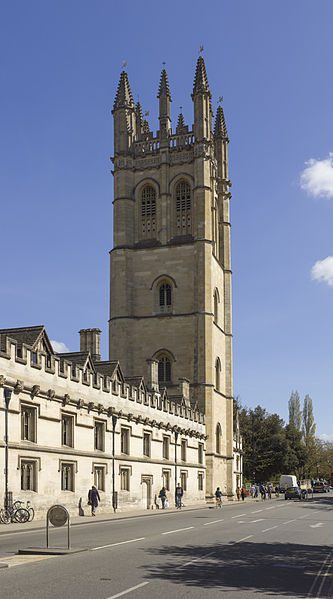
Magdalen College, Oxford, where C. S. Lewis spent much of his academic career, was founded in 1458.
(Wikimedia Commons public domain image)
On Wednesday, I posted a quotation from G. K. Chesterton’s classic 1908 book Orthodoxy:
“Rebelling against everything?”
In my opinion, the point that he was making there is akin to an argument later made by C. S. Lewis and then by Thomas Nagel.
In 2012, Nagel, an eminent professor of philosophy at New York University — perhaps most widely known for his famous 1970s article “What Is It Like to Be a Bat?” — published Mind and Cosmos: Why the Materialist Neo-Darwinian Conception of Nature is Almost Certainly False with Oxford University Press.
In it, Nagel voiced support for various scholars (e.g., Michael Behe, David Berlinski, and Steve Meyer) associated with the so-called Intelligent Design movement. But that was scarcely the most significant aspect of his book.
In a review of Mind and Cosmos for the New York Review of Books (7 February 2013) titled “Awaiting a New Darwin,” the evolutionary geneticist H. Allen Orr, Shirley Cox Kearns Professor of Biology at the University of Rochester, sympathetically summarized part of Nagel’s thesis as follows:
“Consciousness is the most conspicuous obstacle to a comprehensive naturalism that relies only on the resources of physical science. The existence of consciousness seems to imply that the physical description of the universe, in spite of its richness and explanatory power, is only part of the truth, and that the natural order is far less austere than it would be if physics and chemistry accounted for everything.”
As Nagel himself puts it in Mind and Cosmos,
“Evolutionary naturalism provides an account of our capacities that undermines their reliability, and in doing so undermines itself.”
C. S. Lewis had made a similar point decades earlier in his book Miracles, contending that a strict materialism refutes itself:
“If my mental processes are determined wholly by the motions of atoms in my brain, I have no reason to suppose that my beliefs are true . . . and hence I have no reason for supposing my brain to be composed of atoms. . . .
“A theory which explained everything else in the whole universe but which made it impossible to believe that our thinking was valid would be utterly out of court. For that theory would itself have been reached by thinking, and if thinking is not valid that theory would, of course, be demolished. It would have destroyed its own credentials. It would be an argument which proved that no argument was sound — a proof that there are no such things as proofs.”
Lewis’s argument was easy for some to ignore, if not so easy to refute, because, of course, he was a very vocal Christian theist and apologist. Thomas Nagel presents a different sort of challenge, however, and he is not so casually to be dismissed. He is an atheist.
Posted from Newport Beach, California










